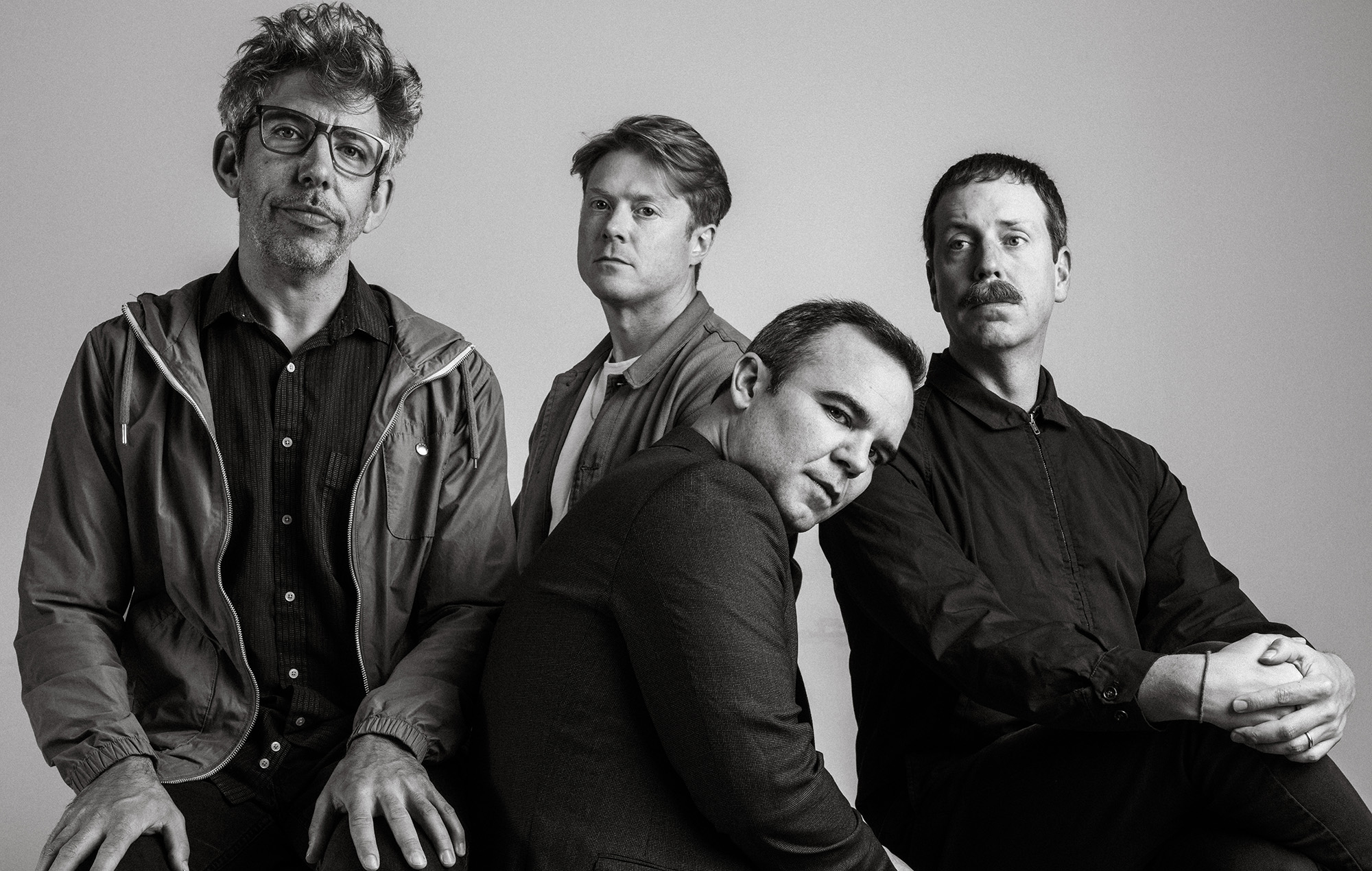“The story of this album actually begins in the middle, not at the start,” Samuel T. Herring tells NME of ‘People Who Aren’t There Anymore’, the seventh Future Islands LP. The crux of the follow-up to 2020’s ‘As Long As You Are’ centres around the break-up of Herring’s relationship with his partner, Swedish actress Julia Ragnarsson, and the period of upheaval that followed.
After toiling away in the dive bars of the United States for nearly a decade, the band broke through with their 2014 album ‘Singles’, an ecstatic explosion of synth-pop fronted by Herring’s crazed, beautiful vocals and viral stage antics. Since then, they slowly and carefully refined the sound that got them their break across the following albums ‘The Far Field’ (2017) and ‘As Long As You Are’.
While the last decade of Future Islands had largely been one of steady progression, ‘People Who Aren’t There Anymore’ represents a reassessment for the band, both personally and musically. There are songs on the new album, Herring says, that make far more sense to him now his relationship is over than when he wrote them, as if his subconscious was trying to warn him of the impending endpoint. Listening to it with this context makes the revelations sound both powerful and painful.
“‘As Long As You Are’ was about the beginning of that relationship, and the understanding of coming to peace within a relationship for the first time in my life,” Herring tells NME. After ‘As Long As You Are’ was finished, the pandemic hit and Herring was separated by the Atlantic from his then-partner, and penned ‘People Who Aren’t There Anymore’ opener ‘King Of Sweden’ and a handful of others that made the new album. “I saw those [new] songs as being songs of loving someone, and how the long is going to pull us through to the end despite all this hardship,” he remembers.
After the pandemic and the split, he viewed them differently. On the song ‘The Tower’, when Herring sings, “I’m watching and I’m waiting / I’m not breaking,” the singer says he retroactively realises how he wasn’t a person in love and holding onto it, but “a person slowly losing. On ‘Deep In The Night’, I sing, “When this ends I’ll find you”, but the truth was that it didn’t happen that way.”
The new album contains all the bombast and drama of Future Islands’ best work, but there’s a new sense of heavy reflection here that didn’t permeate the buoyant ‘As Long As You Are’. “This is the end of that story, and the beginning of the next chapter,” Herring says. “I really feel like our albums have gone from a place where they were just records we were making to actually now being more like chronicles. It’s the next group of chapters of this longer story.”
Future Islands Credit: Morgan Sinclair
When NME calls Herring and his bandmates – bassist William Cashion, keys player Gerrit Wilmers and drummer Michael Lowry – the singer is back in Baltimore on a rare trip home to “pick up my mail”, but has largely spent his time post-pandemic “living out of a suitcase”. Cashion now lives in Los Angeles, with Future Islands spread out across the United States and beyond for the first time in their near-20-year time as a band.
After the band spent the first COVID lockdown promoting and releasing ‘As Long As You Are’, the aftermath of the album’s release, where they couldn’t tour behind it as would have been normal, saw them dissipate and take stock. Herring continued his rap side-hustle by featuring on tracks by Billy Woods and more, and also launched an acting career, starring alongside LaKeith Stanfield in new Apple TV+ show The Changeling, which Cashion also has a cameo in.
It all results in ‘People Who Aren’t There Anymore’ being the most reflective Future Islands album yet. Musically, the band largely stay in their immersive synth-pop lane, but it’s the album’s lyrics that represent the biggest step forwards. “Feeling like i’m 15, wandering with the Misfits,” Herring sings on ‘King Of Sweden’, translating that feeling of exiting a relationship and emerging as if you were a teenager again, with the world both completely open to you and totally terrifying at once. “I lie, tell myself, “it’s okay”, when it’s not quite,” he painfully admits on ‘The Tower’, letting his optimistic mask slip a little. It’s these moments where ‘People Who Aren’t There Anymore’ shines brightest, and gorgeous closing track ‘The Garden Wheel’ serves as both a final post mortem and the first green shoots of recovery for the future.
The impermanence of a life on the road also began to hit home for the band through the period of stasis that the pandemic brought, understanding that your work and the lifestyle it demands will bring you in and out of people’s lives at irregular intervals. This is all reflected in the album’s title, which can be read as a signifier of grief, lost friendships and love that disappeared. It’s also Future Islands’ nod to past versions of themselves, skins they had to shed in order to carry on.
‘People Who Aren’t There Anymore’ is the title of a painting by Albuquerque, New Mexico-based artist and Future Islands fan Beedallo, and another of their works was used by the band as the new album’s artwork. The title of the piece that was used for the cover, ‘Fading Memory Of A Face’, also feels in-tune with the hazy, sombre reflections of the album.
“The question of the album is: what comes next?” Herring muses. “What you find out when you keep living is that we go through these cycles in our lives, and sometimes we find ourselves in the same places as before, but we’re different people when we get to those places. The person I was 10 years ago going through a breakup is very different than the person I am now.”
On ‘People Who Aren’t There Anymore’, a powerful and emotionally conflicted document of decay and subsequent renewal, Herring tries to get to the root of these issues, and work out the best way to carry on after everything falls apart. “I want to know how to move forwards with more clarity and strength,” he says. “When you’re young, everything is outward instead of inward, but I want to have more acceptance of my part in things as well. I find that the journey is important to share.”
‘People Who Aren’t There Anymore’ is out January 27 via 4AD.
The post Future Islands want to know what comes next appeared first on NME.




